
|
|
ZIMBABWE
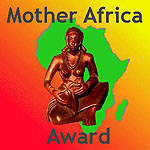
|
|
|
|

|
|
|
Official Name
|
Republic of Zimbabwe
|
|
Located
|
South: Zambia, Mozambique, Botswana, South Africa
|
|
Capital
|
Harare
|
|
Head of State |
President Robert G. Mugabe
|
|
Area
|
390,310 sq km
|
|
Population
|
11.3 million
|
|
Growth rate
|
1.4%
|
|
Language
|
English, Shona & Sindebele
|
|
Currency
|
Zimbabwe dollar
|
|
GNP per capita
|
$580
|
|
Inflation
|
64.4%!!
|
Airlines
(advertise here)
|
from Europe: ________________
from Asia: ________________
from USA: ________________
|
Hotels
(advertise here)
|
Names & Rates per night
Boulevard Hotel Nairobi
________________
|
|
USAfrica Agent
|
________________
|
|
Country Advertiser
|
If you want to become
the Country Advertiser
your logo comes here.
|
|
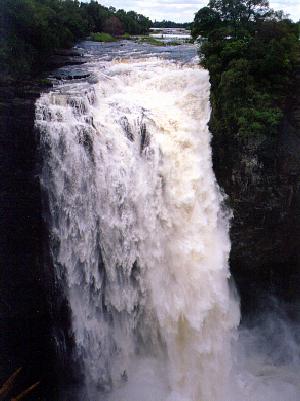
©2001: Bernard Cloutier
Victoria Falls
|
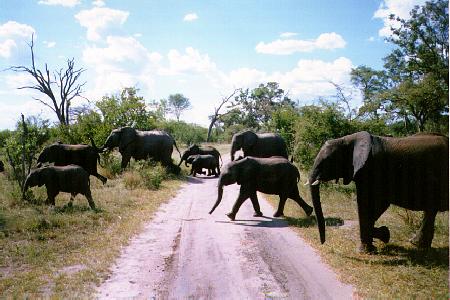
©2001: Bernard Cloutier
Zimbaphants
|
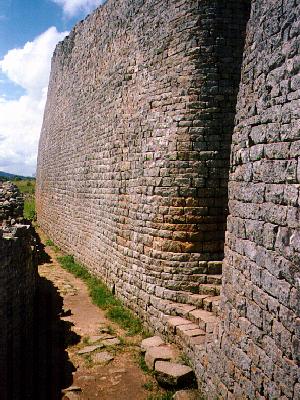
©2001: Bernard Cloutier
Great Enclosure
|
|
|
Zimbabwe (ex Southern Rhodesia and later Rhodesia) is a landlocked country bordered by Zambia, Mozambique, South Africa and Botswana. Centre of a thriving iron age civilisation in 1400 AD, with ancient city ruins at Great Zimbabwe, it was explored by Livingstone in 1855 and administered by the British South Africa Company from 1890.
While it’s not without problems, Zimbabwe is a beautiful country and could be a relatively safe. The people are friendly, their music and arts are world famous, the national Parks are among Africa’s finest, and the bright cities of Harare and Bulawayo boast a variety of attractions. World famous Victoria falls and it’s growing number of adrenaline-junkie activities.
Oral tradition has it that Great Zimbabwe Enclosure or 'Great House of Stone' was built in the 12th century by the Karanga Bantu tribes who moved into this area from the north in the 8th century and were the ancestors of today's Shona majority. For centuries, the Karanga and the succeeding Rozvi dynasties ruled supreme. Great Zimbabwe is composed entirely of granite blocks cut to a specific size and fitted together ingeniously without aid of mortar. Close on a million such blocks were used. Some were cut into small pieces for decorative edgings or insets - the distinctive chevron pattern is the most common. It is believed that building began, on the Hill Complex, between 1100 and 1150 AD. At its peak about 30'000 people were estimated to be living in the area. The most recent archaeological studies indicate by carbon dating that it has been inhabited continually from the 3rd century AD to the early 19th century.
|
Harare:
|
Harare was founded in 1890 and then called Salisbury after Lord Salisbury, the British Prime minister. After the creation of the railway from Beira, Mozambique, this city grew significantly. Salisbury was the colony capital of Southern Rhodesia, of the Federation of Rhodesia; which lasted for a short time, and Nyasaland; which lasted from 1953 to 1963. It was also the capital Rhodesia from 1965 to 1979. Harare is the commercial and industrial center of Zimbabwe. It is also a transportation center, serving as a junction for air, road and rail travel. There are important gold mines in the surrounding areas. Moreover, agricultural produce from the surrounding areas, like Victoria tobacco, come to Harare for distribution.
|
|
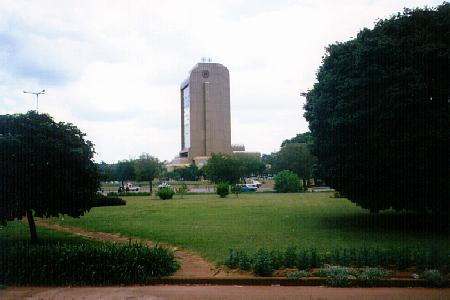
©2001: Bernard Cloutier
Sheraton Hotel Harare
|
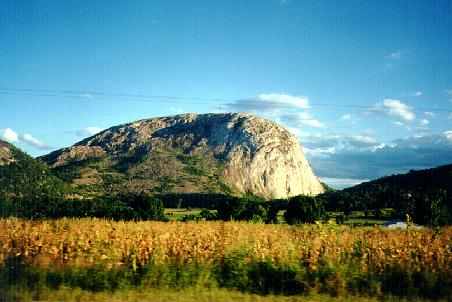
©2001: Bernard Cloutier
"Kopje"
|
|
Transfrontier Park:
The area surrounding the Okavango-, Kwando- and Zambezi Rivers, has been described as the "Eden of Africa"
as long ago as in the beginning of the previous century. Since then very little and very much has changed.
Much has changed in this sense that the areas has been carved up into 5 different countries and has
experienced the scourges of war. Little has changed in this sense that hardly any development has taken
place and the border is often just a line drawn on a map - still peoples and wildlife co-exist in harmony
and trek across borders at will.
This amazing area varies from the "Thirstland" of the Kalahari Desert, to the amazing Okavango Swamps and the tropical paradise around the world famous Victoria Falls. Large sections of this area has never been fully explored but more than 500 species of birds have been listed. The animal kingdom is truly remarkable with Sable antelope, Roan antelope, elephant, buffalo, hippopotamus and crocodile in abundance.
Read the full story CLICK HERE
Economy:
HARARE, Zimbabwe 23 August 2001 (AP): -- Foot-and-mouth disease has broken out
among Zimbabwe's livestock after diseased animals were released by ruling party militants from quarantine areas on white-owned farmland, cattle industry officials said. The Zimbabwean government said it has halted all beef exports to Europe as a precaution. The disease will cost Zimbabwe's struggling economy at least $40 million in exports, government officials said, deepening the country's economic crisis.
Zimbabwe’s economy relies heavily on agricultural crops such as tobacco, cotton, and sugarcane, and on related manufacturing industries such as textiles and sugar production. Mining, primarily gold, is also a major activity.
History:
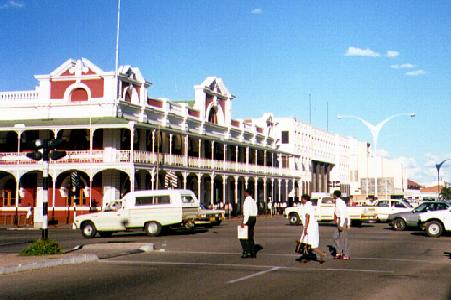
©2001: Bernard Cloutier
Bulawayo
|
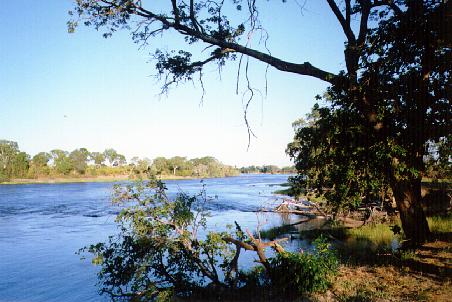
©2001: Bernard Cloutier
Zambesi River
|
|
|
In the mid 15th century the Mwene Mutapa Empire were based here and covered most of Zimbabwe and much of Mozambique. It thrived on agriculture and traded gold and ivory with the Arabs on the coast for glass, porcelain and cloth from Asia. In the 16th, the Mwene Mutapa went into decline as they submitted to the influence of missionaries sent by the Portuguese who had taken control of the coast. Meanwhile, the Rozwi Empire was expanding from the west replacing the Mwene Mutapa and driving the Portuguese back to the coast by the end of the 17th. The Rozwi occupied and added to the Great Zimbabwe site until they were defeated by the Ngoni tribes who moved in from the south around 1830 during the great "mfecane" migrations caused by the Zulu's aggressive military expansion. Most of the Ngoni moved on with groups settling in Zambia, Tanzania and Mozambique. Those that remained set up the Ndebele state under Mzilikazi based near Bulawayo. Zimbabwe's 20% Ndebele minority are descendants of these migrants. The Zimbabwe site was abandoned around 1860 some 30 years before Cecil Rhodes and his band of land pirates invaded what became Southern Rhodesia and built Fort Victoria in nearby Masvingo
|
Zimbabwe became independent in April 1980, when the Lancaster House agreements with Britain brought to an end 15 years of unilaterally declared independence by the former white-minority Government of Rhodesia and the armed conflict that engendered it. The Zimbabwe African National Union-Patriotic Front (ZANU-PF) has been in power since 1980. Independent Zimbabwe inherited an economy that was more industrialized than most in Africa, with a diversified productive base, well-developed infrastructure and a relatively sophisticated financial sector. Currently, most large-scale commercial farms are owned by the white minority, while the majority of the population lives on less productive agricultural land. Zimbabwe embarked on a substantial economic reform process in 1991 which was not successfully carried through. Since the late 90s, it has been grappling with the resolution of fiscal problems; the inequities in land distribution, poverty and unemployment problems; population pressures; and unfavorable rainfall patterns. Economic deterioration has been exacerbated this year by invasions of commercial farms and continued military involvement in the Democratic Republic of Congo.
Zimbabwe is a multiparty republic with an executive president and a parliament consisting of 150 members. Ten members are chosen by traditional chiefs, 20 are appointed by the President, and the balance are elected.
In June 1999 President Mugabe appointed a commission to draw up a new constitution, which would grant greater powers to the president and included a provision that Britian should compensate farmers for lands bought as part of the land resettlement programme. In a referendum in February 2000, a low voter turnout voted against the new constitution, in what was seen as a vote of no confidence in Mugabe. The new constitution was quickly ammended in minor ways and taken to Parliament where it was approved in June 2000. Attempts were made to oblige Britian to compensate farmers for the loss of their land. War veterans began invading farms resulting in violence and the deaths aof farmers and opposition supporters. No action was taken by the authorities to stop them. Parliamentary elections took place in the middle of this unrest. The ruling party won 62 seats against the 57 of the opposition. Although outside observers declared that the election was mostly fair, it reported that the ruling party was respobsible for most of the pre-election intimidation. The most recent parliamentary election, held in June 2000, returned Mr. Robert Mugabe and the ruling ZANU party to power with a narrow margin. The opposition party, MDC, won the majority of the urban votes. Presidential elections are scheduled for 2002. War veterans, invaded a number of commercial farms in the run-up to the elections. In response, the Government has gazetted over 2,000 farms for compulsory acquisition and resettlement. Efforts continue on the part of several parties including the donors to find an orderly and satisfactory approach to land reform.
Enabling us to improve the quality of the content, if you have additonal information, remarks or suggestions, please share it with us by e-mail.
21 - 26 October 2003: AUSTRALIA/ADELAIDE - 6 DAY ZIMBO'S MEETING
The “Zimbabwe Connection” is a not-for-profit, voluntary, Association duly registered in terms of the Associations Incorporations Act, 1985.Its objectives are to provide assistance to all Zimbabweans who, for whatever reasons, have left or are intending to leave Zimbabwe to make a new home for themselves and their families in Australia. The Association has been formed in the knowledge that the number of people leaving Zimbabwe will increase with the current disastrous economic and political situation. The Main Event : October 2003. A planned get together for Zimbabweans to meet up with family and friends dispersed so widely to every corner of the world.
For further information click here
REMARKS
The following message we received from Cathy Buckle).
27th September 2002
Dear Family and Friends,
For well over a year I've been wearing a small yellow ribbon pinned on my shirt in silent protest at what is happening in Zimbabwe and in support of all those people who are suffering - black, brown and white. There are many hundreds of thousands of people who are suffering here now. There are children who can no longer go to school because their parents cannot afford the fees. There are teachers, doctors, nurses, lawyers, magistrates and judges whose lives have become unbearable due to political harassment. There are hundreds of brave men and women who continue to suffer the most extreme intimidation, physical and psychological torture because they openly support the opposition political party. There are many thousands of farmers and their workers who have been evicted from their homes and lost their farms and employment. There are many thousands of people who have literally nothing to eat and to the outsider all these are mere statistics. But they are not just numbers, they are real people just like you and me and this week I am wearing my small yellow ribbon for three farmer's wives.
I was hot and fed up on Friday morning having stood for a long time as the 42nd person in a queue at our local Marondera supermarket for one loaf of brown bread. Long before I got to the front, the bread was finished so I bought the newspaper instead. On the front page is the story that the government's much talked about irrigation of a winter crop of maize that was supposed to be the saving grace of us all, is about to be harvested. It turns out that at best it will only yield enough food for the country for one and half days. Leaving the supermarket with only food for thought I felt pretty low as I passed the arrogant groups of youngsters wearing Zanu PF T shirts who've been crowding our town the whole week, ready to harass voters in the weekends' council elections. As I got into my car a man stood at my window, his hands held as if in prayer, "Oh please help me with something to eat" he begged. Then I stopped in at the dentist who told me that he is struggling to keep going. Yesterday he and his partner saw only 10 patients as opposed to the 40 they normally see in a day - dentists and doctors have become a luxury that most of us can no longer afford.
By the time I got home I felt pretty depressed but then the phone rang. A woman I have never met or spoken to before said: "Oh please Cathy, can I talk to you, I know I don't know you but please can I just talk to you?" She is a farmer's wife and through her tears I listened to yet another story of utter hell which involves 30 months of extreme harassment and intimidation. This was the third such call from a stranger that I'd had in a few days and these women are so incredibly brave that I feel ashamed to be sitting in the comfort of my relatively civilized Marondera home. Every day they face drunk and doped up strange men who hurl obscene abuse at them. At night they have to try and sleep while men sing drunkenly and bang on tins to try and scare them out of their homes. Some days they are threatened with sticks, pangas and other crude weapons; other days the men have guns. These horrors have become a part of every day life for the few commercial farmers still trying to grow food for Zimbabwe. A woman, arriving on a farm this week, told the owners to get out and in a hurry as this was now her home. She was accompanied by five men armed with AK rifles. She refused to shake hands with the farmer saying she didn't shake hands with whites and went on to say that she hadn't tasted "white blood" since 1980. This woman gets away with saying and doing these things not because she is black but because she belongs to Zanu PF. Not only does she belong to the ruling party but she is the wife of the Commander of the Zimbabwe Army. This is the calibre of our new commercial farmers and while these obscenities go on, the world does absolutely nothing but use diplomatic double talk. While they do this, more and more people become victims and go to work hungry and to bed at night on empty stomachs.
Recently I came across a saying which reads: "What we do, we become". If this is true about me and my little yellow ribbon then I wonder what lies in store for the woman who wants to taste white blood and for the world's politicians who sit back and watch Zimbabwe dying. Until next week, with love, cathy. http://africantears.netfirms.com Copyright: Cathy Buckle, 27th September 2002.
(Another response)
Zimbabwe is in crisis. The country is inches away from economic collapse
and a massive humanitarian disaster is about to unfold. This could cause
the demise of Zimbabwe as we know it. The Zimbabwean Government have paid
lip service to the requirements of the Abuja Accord (as expected) and have
continued to harass farmers and displace thousands of farm workers. 25,000
have been dislodged in the last 5 weeks alone. And yet, this is only the tip of the iceberg. Since February 2000, about 500 commercial farmers have been forced, under
threat of death or violence to themselves and their workers, to cease
farming operations. It is under these circumstances that at least 250
large-scale commercial farms, representing over 15,000 farm worker families
(approx. 75,000 men, women and children), have had to fully cease
operations. The self-styled war veterans have subjected farm workers to the most
appalling indignities. Many have been physically assaulted or tortured and
have had to watch as others are attacked in front of them as an example. A
large number of the women and girls have been beaten and raped. By mid
September 2001, an estimated 30 farm labourers had been killed since the
onset of the farm invasions. The majority of displaced farm workers have nowhere to go. Many have been on the farms for generations. Countless thousands are now scattered widely
around the farming areas, sometimes simply encamped along the roadsides
with no facilities whatsoever.
(Source: Charles Boscawen)
Zimbabwe faces food shortages later 2001 and may need international aid.
"That there will be shortages in national production is confirmed.
The uncertainty is the magnitude," Finance Minister Simba Makoni told journalists
in July.
"Vic's Tavern/Hotel" in Chivhu is sparse, but livable. No hot water, but good food, and friendly service. Price about $18 for a single.
(Marc Lurie)
Last update: 6 August 2009
|











